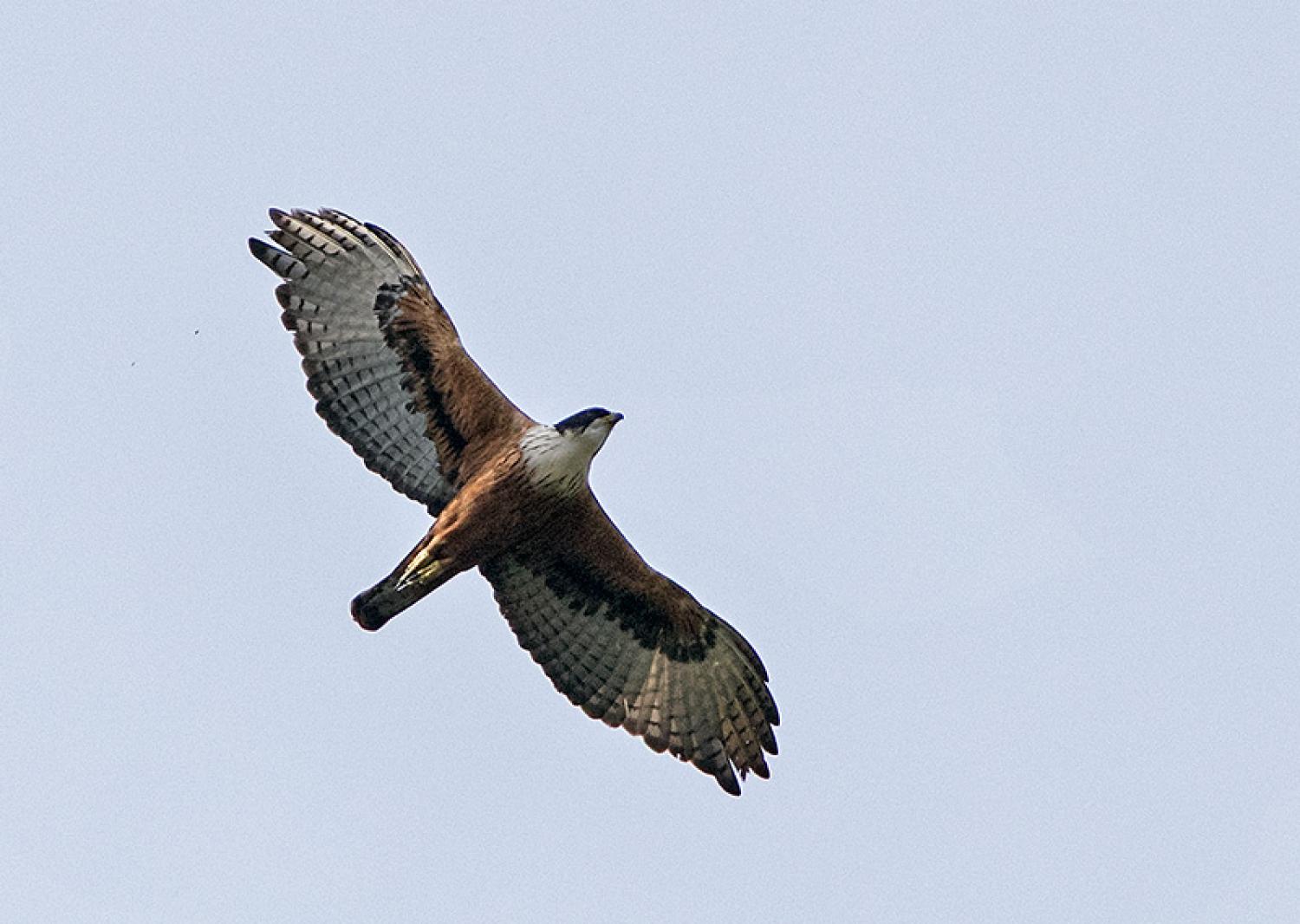Species of Thailand
Rufous-bellied eagle
Lophotriorchis kienerii
L. E. G. de Sparre, 1835
In Thai: เหยี่ยวท้องแดง
The rufous-bellied eagle or rufous-bellied hawk-eagle (Lophotriorchis kienerii) is a bird of prey in the family Accipitridae that is found in the forested regions of tropical Asia. Relatively small for eagles and contrastingly patterned like a falcon, this species was earlier placed in the genus Hieraaetus and sometimes also in the genus Aquila but thought to be distinctive enough to belong to a separate genus.
Taxonomy and systematics
This eagle was originally described as Astur kienerii on the basis of a specimen from the Himalayas. It was later moved to Limnaetus by Jerdon, the genus Lophotriorchis and still later to Hieraaetus, the so-called "hawk-eagles". A study of the phylogeny of some Hieraaetus species and other eagles indicated that they were nested within the Aquila clade of eagles, resulting in their repositioning. Another molecular study of the eagles suggested that kienerii was distinctive enough to be retained in a separate genus for which the name Kienastur had been suggested but as this occurred in a thesis it is invalid for taxonomic purposes, and in any case Lophotriorchis was proposed much earlier (though originally shared with the Black-and-chestnut eagle which is nowadays placed in Spizaetus).
Within its wide range, two subspecies are recognized although there is no marked plumage difference. The nominate kienerii of India and Sri Lanka (the northern birds are larger); and formosus described by Erwin Stresemann in 1924 which is widely distributed across Southeast Asia from Burma to Sulawesi.
Description
Adult rufous-bellied eagles are distinctive in their pattern. They have a black hood with a short crest. Chestnut underparts and wing coverts contrast with the white on the throat and breast. The sexes are almost indistinguishable in plumage but females are slightly larger and have more black on the face. They perch in a very upright stance and the wingtip almost reaches the tail. The tarsus is fully feathered. Juveniles have very white underparts with dark markings on the sides of the body, head mask and edge of underwing coverts. They can appear similar to a booted eagle (Aquila pennata). In flight, the underwing lining is dark and the greater coverts are black. The flight feathers are thinly barred with a black edge. The tail is dark and barred.
Distribution and habitat
The rufous-bellied eagle is found in southern and south-eastern Asia and its range also extends to Sulawesi.
This species is associated mainly with hill forests. In India, they are commoner in the Western Ghats than along the Himalayas where they occur from Nepal to Assam. They also occur in parts of the Eastern Ghats.
Behaviour and ecology
Rufous-bellied eagles are usually seen in flight, soaring high over the forest canopy. They dive to capture prey that can include birds and mammals in the air, canopy, or forest floor. Birds the size of the Sri Lanka wood pigeon, Kalij pheasant and junglefowl have been recorded as prey. The breeding season of the eagles is in winter with the young fledging in spring when the prey species are also breeding. The display flight involves stooping and wing-quivering. Their calls include a series of high pitched fwick, fwick... notes followed by a thin sweek!. They nest on a large, often bare tree, building a large platform of dry sticks and branches that they break off. The nest is lined with green leaves and a single egg is laid. Both parents take turns in incubation, feeding and nest defence.
This article uses material from Wikipedia released under the Creative Commons Attribution-Share-Alike Licence 3.0. Eventual photos shown in this page may or may not be from Wikipedia, please see the license details for photos in photo by-lines.
Category / Seasonal Status
BCST Category: Recorded in an apparently wild state within the last 50 years
BCST Seasonal status: Resident or presumed resident
Scientific classification
- Kingdom
- Animalia
- Phylum
- Chordata
- Class
- Aves
- Order
- Accipitriformes
- Family
- Accipitridae
- Genus
- Lophotriorchis
- Species
- Lophotriorchis kienerii
Common names
- Thai: เหยี่ยวท้องแดง
Synonyms
- Astur Kienerii protonym
- Hieraaetus kienerii
Conservation status

Least Concern (IUCN3.1)

Near Threatened (BirdLife)

Near Threatened (ONEP)

Near Threatened (BCST)
Photos
Please help us review the bird photos if wrong ones are used. We can be reached via our contact us page.
Range Map

- Bang Lang National Park
- Doi Inthanon National Park
- Doi Pha Hom Pok National Park
- Hala-Bala Wildlife Sanctuary
- Kaeng Krachan National Park
- Khao Banthat Wildlife Sanctuary
- Khao Khitchakut National Park
- Khao Luang National Park
- Khao Nam Khang National Park
- Khao Phra - Bang Khram Wildlife Sanctuary
- Khao Soi Dao Wildlife Sanctuary
- Khao Sok National Park
- Khao Yai National Park
- Kui Buri National Park
- Mae Wong National Park
- Mueang Chiang Mai District, Chiang Mai
- Phu Khiao Wildlife Sanctuary
- Ra-ngae District, Narathiwat
- San Kala Khiri National Park
- Sri Phang-nga National Park
- Thale Ban National Park
- Thap Lan National Park
- Thung Yai Naresuan Wildlife Sanctuary
- Ton Nga-Chang Wildlife Sanctuary
